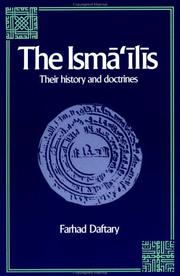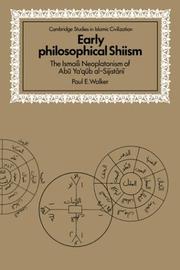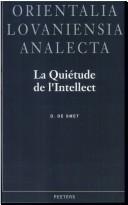| Listing 1 - 6 of 6 |
Sort by
|

ISBN: 0521370191 0521429749 9780521429740 9780521370196 Year: 1992 Publisher: Cambridge Cambridge University press
Abstract | Keywords | Export | Availability | Bookmark
 Loading...
Loading...Choose an application
- Reference Manager
- EndNote
- RefWorks (Direct export to RefWorks)
297 --- Ismailites --- Ismaili --- Ismailians --- Assassins (Ismailites) --- Shīʻah --- Islam. Mohammedanisme --- Ismailites. --- Ismailiten. --- Geschichte. --- Doctrines --- History --- Ismailis
Book
ISBN: 131687091X 1316870952 1316650472 1316870995 1316871010 1316871053 1107154081 1316871037 9781316871058 9781316650479 9781316871010 9781316871034 9781107154087 Year: 2017 Publisher: Cambridge New York
Abstract | Keywords | Export | Availability | Bookmark
 Loading...
Loading...Choose an application
- Reference Manager
- EndNote
- RefWorks (Direct export to RefWorks)
This book explores the evolution of a Shia Ismaili identity and crucial aspects of the historical forces that conditioned the development of the Muslim modern in late colonial South Asia. It traces the legal process that, since the 1860s, recast a Shia Imami identity for the Ismailis, and explicates the public career of Imam Aga Khan III amid heightened religious internationalism since the late-nineteenth century, the age of 'religious internationals'. It sheds light and elaborates on the enduring legacies of questions such as the Aga's understanding of colonial modernity, his ideas of India, restructured modalities of community governance and the evolution of Imamate-sponsored institutions, key strands in scholarship that characterized the development of the Muslim and Shia Ismaili modern, and Muslim universality vis-à-vis denominational particularities that often transcended the remits of the modular nation and state structure.
Ismailites --- Shīʻah --- Shiites --- Shia Muslims --- Shiah Muslims --- Shiahs --- Shias --- Shiite Muslims --- Muslims --- Ismailians --- Ismailis --- Assassins (Ismailites) --- Imamites --- Shia --- Shiism --- Twelvers (Islam) --- Islamic sects --- Alids
Book
ISBN: 1474479588 9781474479585 9781474479592 Year: 2022 Publisher: Edinburgh : Edinburgh University Press,
Abstract | Keywords | Export | Availability | Bookmark
 Loading...
Loading...Choose an application
- Reference Manager
- EndNote
- RefWorks (Direct export to RefWorks)
This book tells the story of a manuscript repository found all over the pre-modern Muslim world: the khizanat al-kutub, or treasury of books. The focus is on the undisclosed Arabic manuscript culture of a small but vibrant South Asian Shi'i Muslim community, the Bohras. It looks at how books that were once part of one of the biggest imperial book repositories of the medieval Muslim world, the khizanat of the Fatimids of North Africa and Egypt (909CE-1171CE) ended up having a rich social life among the Bohras across the Western Indian Ocean, starting in Yemen and ending in Gujarat. It shows how, under strict conditions of secrecy, and over several centuries, one khizana was turned into another, its manuscripts gaining new meanings in the new social realities in which they were preserved, read, transmitted, venerated and copied into. What emerged was a new distinctive Bohra Ismaili manuscript culture shaped by its local contexts.
Ismailites --- Manuscripts, Arabic --- Ismailians --- Ismailis --- Assassins (Ismailites) --- Shīʻah --- Arabic manuscripts --- 091 =927 --- 091 <540> --- 091 <540> Handschriftenkunde. Handschriftencatalogi--India --- Handschriftenkunde. Handschriftencatalogi--India --- 091 =927 Handschriftenkunde. Handschriftencatalogi--Arabisch --- Handschriftenkunde. Handschriftencatalogi--Arabisch --- Church libraries.

ISBN: 0521441293 0521060826 0511520646 0511833970 9780521441292 9780511520648 9780521060820 Year: 1995 Publisher: Cambridge Cambridge University press
Abstract | Keywords | Export | Availability | Bookmark
 Loading...
Loading...Choose an application
- Reference Manager
- EndNote
- RefWorks (Direct export to RefWorks)
The Ismailis, among whom are the followers of the Aga Khan, rose to prominence during the fourth Islamic/tenth Christian century. They developed a remarkably successful intellectual programme to sustain and support their political activities, promoting demands of Islamic doctrine together with the then newly imported sciences from abroad. The high watermark of this intellectual movement is best illustrated in the writings of the Ismaili theoretician Abu Yaq́ub al-Sijistani. Using both published and manuscript writings of al-Sijistani that have hitherto been largely hidden, forgotten or ignored, Dr Paul Walker reveals the scholar's major contribution to the development of philosophical Shiism. He analyses his role in the Ismaili mission (da'wa) of that time and critically assesses the major themes in his combination of philosophy and religious doctrine.
Ismailites --- -Neoplatonism --- -Alexandrian school --- Church history --- Hellenism --- Philosophy --- Philosophy, Ancient --- Platonists --- Theosophy --- Ismaili --- Ismailians --- Assassins (Ismailites) --- Shīʻah --- Doctrines --- -History --- History --- Abu Ya'qub al-Sijistani, Ishaq ibn Ahmad --- -Contributions in Islamic philosophy --- Abu Yaqub al-Sijistani, Ishaq ibn Ahmad, --- Contributions in Islamic philosophy. --- Neoplatonism --- History. --- Ismailis --- Alexandrian school --- Doctrines&delete& --- Abū Yaʻqūb al-Sijistānī, Isḥāq ibn Aḥmad, --- Abū Yaʻqūb al-Sijzī, Isḥāq ibn Aḥmad, --- Sijistānī, Abū Yaʻqūb Isḥāq ibn Aḥmad, --- أبو يعقوب السجستاني، إسحاق ابن احمد --- أبو يعقوب السجستاني، إسحاق بن أحمد --- أبو يعقوب السجستاني، إسحق بن أحمد --- أبو يعقوب السجستاني، اسحق بن أحمد، --- Arts and Humanities --- Religion --- Ismailites - Doctrines - History. --- Neoplatonism - History. --- Abu Yaqub al-Sijistani, Ishaq ibn Ahmad, - 10th cent. - Contributions in Islamic philosophy. --- Abu Yaqub al-Sijistani, Ishaq ibn Ahmad, - 10th cent.

ISBN: 9068316923 9789068316926 Year: 1995 Volume: 67 Publisher: Leuven Peeters
Abstract | Keywords | Export | Availability | Bookmark
 Loading...
Loading...Choose an application
- Reference Manager
- EndNote
- RefWorks (Direct export to RefWorks)
Hamid ad-Din al-Kirmani est le plus influent auteur ismaélien sous le règne du calife fatimide al-Hakim (996-1021). Ayant vécu à une époque troublée qui vit la naissance du mouvement druze, il élabora un système cohérent dans lequel il tenta de reformuler la gnose ismaélienne à l'aide de notions empruntées au kalâm et à la falsafa (al-Fârâbî), tout en puisant directement à des sources néoplatoniciennes (Plotin et Proclus). Le présent ouvrage offre la première analyse critique de cette synthèse, basée principalement sur le Kitâb Râhat al-'Aql, le «Livre de la Quiétude de l'Intellect». Abordant successivement les thèmes suivants : tawhîd et théologie négative, création ex nihilo et émanation, Intellect et Plérôme des dix Intelligences séparés, ainsi que leur action démiurgique, providentielle et sotériologique, ce livre contribue à la fois à l'étude de néoplatonisme arabe, de la falsafa entre al-Fârâbî et Avicenne, et de l'ismaélisme fatimide.
Hamîd ad-Dîn al-Kirmânî --- Islam --- Neoplatonism --- Neoplatonisme --- Néo-platonisme --- Oosterse filosofie --- Philosophie orientale --- Ismailites --- Ismaéliens --- Doctrines --- Kirmani, Hamid al-Din Ahmad ibn 'Abd Allah, --- Doctrines. --- Kirmānī, Ḥamīd al-Dīn Aḥmad ibn ʻAbd Allāh, --- -Academic collection --- Ismaili --- Ismailians --- Assassins (Ismailites) --- Shīʻah --- Kirmani, Hamid al-Din Ahmad ibn 'Abd Allah --- Kirmānī, Ḥamīd al-Dīn Aḥmad ibn 'Abd Allāh, --- Ismaéliens --- Kirmānī, Ḥamīd al-Dīn Aḥmad ibn ʻAbd Allāh, --- Academic collection --- Aḥmad ibn ʻAbd Allāh al-Karmānī, --- Aḥmad ibn ʻAbd Allāh al-Kirmānī, --- Ḥamīd al-Dīn Aḥmad ibn ʻAbd Allāh al-Karmānī, --- Ḥamīd al-Dīn Aḥmad ibn ʻAbd Allāh al-Kirmānī, --- Ḥamīd al-Dīn al-Kirmānī, --- Karmānī, Aḥmad ibn ʻAbd Allāh, --- Karmānī, Ḥamīd al-Dīn Aḥmad ibn ʻAbd Allāh, --- Kirmānī, Aḥmad ibn ʻAbd Allāh, --- أحمد حميد الدين الكرماني --- كرماني، حميد الدين أحمد بن عبد الله --- كرماني، حميد الدين أحمد بن عبد الله، --- کرماني، حميد الدين أحمد بن عبد الله --- Hamîd ad-Dîn al-Kimânî --- Philosophy [Islamic ] --- Greek influences --- History --- Gnosticisme. --- Ismaéliens. --- Neoplatonisme. --- Philosophie arabe. --- Philosophie islamique. --- Kirmānī, Ḥamīd Ad-Dīn Al-, --- Contribution à la philosophie islamique. --- Ismailites - Doctrines --- Kirmānī, Ḥamīd al-Dīn Aḥmad ibn 'Abd Allāh, - active 1020 --- Kirmānī , Ḥamīd al-Dīn Aḥmad ibn ʻAbd Allāh (fl.-1020) --- contribution à la philosophie islamique --- doctrines --- Kirmānī , Ḥamīd al-Dīn Aḥmad ibn ʻAbd Allāh (fl.-1020) --- contribution à la philosophie islamique
Book
ISSN: 09292403 ISBN: 9789004255364 9789004255371 9004255362 9004255370 1306210070 Year: 2014 Volume: 103 Publisher: Leiden Boston
Abstract | Keywords | Export | Availability | Bookmark
 Loading...
Loading...Choose an application
- Reference Manager
- EndNote
- RefWorks (Direct export to RefWorks)
Muslim Spain gave rise to two unusual figures in the mystical tradition of Islam: Ibn Masarra (269/883-319/931) and Ibn al-ʿArabī (560/1165-638/1240). Representing, respectively, the beginning and the pinnacle of Islamic mysticism in al-Andalus, Ibn Masarra and Ibn al-ʿArabī embody in their writings a type of mystical discourse which is quite different from the Sufi discourse that evolved in the Islamic east during the 9th-12th centuries. In Mysticism and Philosophy in al-Andalus , Michael Ebstein points to the Ismāʿīlī tradition as one possible source which helped shape the distinct intellectual world from which both Ibn Masarra and Ibn al-ʿArabī derived. By analyzing their writings and the works of various Ismāʿīlī authors, Michael Ebstein unearths the many links that connect the thought of Ibn Masarra and Ibn al-ʿArabī to the Ismāʿīlī tradition.
Mysticism --- Islamic philosophy --- Ismailites --- Ibn Masarrah, Muḥammad ibn ʻAbd Allāh, --- Ibn al-ʻArabī, --- Islam --- History --- Dark night of the soul --- Mystical theology --- Theology, Mystical --- Spiritual life --- Negative theology --- Ismaili --- Ismailians --- Assassins (Ismailites) --- Shīʻah --- Arabic philosophy --- Muslim philosophy --- Philosophy, Islamic --- Philosophy, Arab --- Islam&delete& --- Ismailis --- Ibn Masarrah, Muḥammad ibn ʻAbd Allāh, --- Ibn al-ʻArabī, --- Ibn al-ʿArabī, --- History. --- Ibn Masarra, --- Jabalī, Muḥammad ibn ʻAbd Allāh, --- Muḥammad ibn ʻAbd Allāh al-Jabalī, --- Muḥammad ibn ʻAbd Allāh ibn Masarrah, --- ابن مسرة، محمد بن عبد الله --- ابن مسرة، محمد بن عبد الله، --- Andalusi, Mehmet bin Ali, --- Ibn al-ʻArabī, Muḥyī al-Dīn Muḥammad ibn ʻAlī, --- Ibn ʻArabî, --- Ibn ʻArabi, Mohyiddin, --- İbn Arabî, Muhittin, --- Ibn ʻArabī, Muḥyī al-Dīn Muḥammad ibn ʻAlī, --- Ibn ʻArabī, Muḥyiddīn, --- Ibn-i ʻArabī, Muḥīuddīn Muḥammad bin ʻAlī T̤āʼī Undlusī ibn-i ʻArabī --- Ibn Surāqah, --- İbnʼül-arabî, Muhyiddîn, --- Magribi, Mehmet bin Ali, --- Mohyiddin ibn ʻArabi, --- Muḥammad bin ʻAlī T̤āʼī Undlusī ibn-i ʻArabī, Muḥīuddīn, --- Muḥammad ibn ʻAlī, Muḥyī al-Dīn ibn al-ʻArabī, --- Muhittin i̇bn Arabî, --- Muḥīuddīn Muḥammad bin ʻAlī T̤āʼī Undlusī ibn-i ʻArabī, --- Muhiy al Din ibn Arabi, --- Muḥyī al-Dīn ibn ʻArabī, --- Muḥyī al-Dīn Muḥammad ibn ʻAlī ibn al-ʻArabī, --- Muḥyī al-Dīn Muḥammad ibn ʻAlī ibn ʻArabī, --- Muḥyiddīn ibn ʻArabī, --- Muhyiddîn İbnʼül-arabî, --- Raʼīs al-Ṣūfīyah, --- Şeyh-i ekberi, --- Shaykh al-Akbar, --- Taʼi, Mehmet bin Ali, --- T̤āʼī Undlusī ibn-i ʻArabī, Muḥīuddīn Muḥammad bin ʻAlī, --- Undlusī ibn-i ʻArabī, Muḥīuddīn Muḥammad bin ʻAlī T̤āʼī, --- Ibnu Arabi, Muhyiddin, --- ابن العربي، --- ابن عربي --- ابن عربي، --- بن العربي --- لإبن العربي، --- محيى الدين بن عربي --- Mysticism - Islam - Spain - Andalusia - History --- Islamic philosophy - Spain - Andalusia - History --- Ismailites - Spain - Andalusia - History --- Ibn Masarrah, Muḥammad ibn ʻAbd Allāh, - 882 or 883-931 --- Ibn al-ʿArabī, - 1165-1240
| Listing 1 - 6 of 6 |
Sort by
|

 Search
Search Feedback
Feedback About UniCat
About UniCat  Help
Help News
News